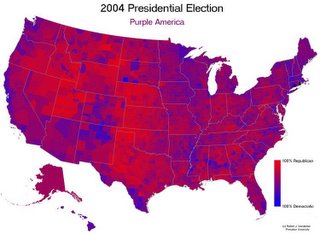One recent topic of discussion was a broad wash regarding politics - perfect! Last fall there was a full-size billboard adjacent to a somewhat rundown section of Wealthy Street. It loudly proclaimed in verse: "DON'T TAKE NO STATIC, VOTE STRAIGHT DEMOCRATIC!" As it was on my daily bus route, I was presented with many opportunities to view and ponder this sign. There are probably three or four potential "issues" about this sign, the least of which is not the phrasology of the message, but for the sake of simplicity (and my own peace of mind) I'll try and stick with just the straight ballot aspect.
The situation at hand is the decision for which (if any) of multiple candidates in multiple races to vote for. To select a straight ballot option with only consideration for the 50/50 (Dems/GOP) is to disregard virtually all functional analysis. In fact, I personally regard the very notion of blindly rattling off R, R, R, R...down the list of options to be quite distasteful. I think that simply knowing which party a candidate is aligned with is not nearly enough information on which to base the casting a vote. Yet, I would imagine (this is pure conjecture) that 75-90% of the voting that takes occurs is based primarily on "us and them" and not much more. A better consideration for how to vote may be to analyze qualities and issues offered by political candidates and base voting on a cognitive result, not a pre-set category. For that matter, I think it's better to not vote at all than to vote arbitrarily.
 Speaking of political categories, it bugs me when people ask if someone is a Republican or a Democrat. We've managed to polarize and reduce American politics to red and blue - each individual is immensely pressured by the culture to compartmentalize themselves as a "member" of one party or another. Is it so wholly unimaginable that someone may be fiscally liberal and socially conservative? Maybe someone strongly supports environmenal preservation and simultaneously opposes to legalized abortion? Each issue (situation) requires contextual analysis. Sure, one may analyze and decide to subscribe to the vast majority of a particular party's stances on issues, but to insist on labeling "our side" is PROBLEMATIC.
Speaking of political categories, it bugs me when people ask if someone is a Republican or a Democrat. We've managed to polarize and reduce American politics to red and blue - each individual is immensely pressured by the culture to compartmentalize themselves as a "member" of one party or another. Is it so wholly unimaginable that someone may be fiscally liberal and socially conservative? Maybe someone strongly supports environmenal preservation and simultaneously opposes to legalized abortion? Each issue (situation) requires contextual analysis. Sure, one may analyze and decide to subscribe to the vast majority of a particular party's stances on issues, but to insist on labeling "our side" is PROBLEMATIC."When ignorance is bliss, 'tis folly to be wise." - Thomas Gray
1 comment:
That's a tough question. I suppose, within the context of "mindfulness," that voting according to party preference can be a thoughtful process. The key issue, I believe, is that cognitive analysis should be utilized, not merely an automated reversion to a potentially arbitrary category.
Post a Comment